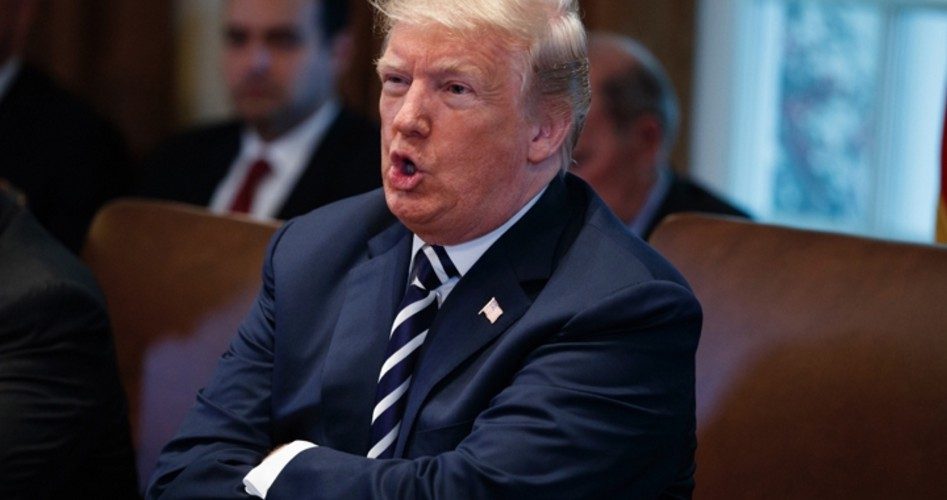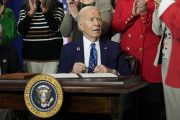
In threatening to deny White House access to news organs peddling “fake news,” President Trump has been accused of launching a full-court press against the press. But, ironically, the notion that such an action constitutes an attack on media freedom is itself an example of fake news.
The Daily Mail reports on the story:
President Donald Trump suggested Wednesday that he might revoke White House credentials for some journalists, following the publication of a survey that showed a dramatic leftward tilt in television news coverage about him.
The Media Research Center, a conservative watchdog group, tracked the evening newscasts on ABC, CBS and NBC for the first four months of this year and found more than 1,600 ‘explicitly positive and negative’ statements about the president.
The group determined that nine out of 10 of those broadcast statements were negative. It did not include CNN and MSNBC in its research.
Trump vented, saying: “The Fake News is working overtime. Just reported that, despite the tremendous success we are having with the economy & all things else, 91% of the Network News about me is negative (Fake). Why do we work so hard in working with the media when it is corrupt? Take away credentials?”
Interestingly, the Mail did not fail to prove Trump’s point, writing in its headline that the president’s proposal was the “latest attack on [a] free press.” This itself is fake news.
Note that having White House press credentials is not a right, but a privilege; in fact, virtually none of the extant news organs have them — only the privileged few. To the best of my knowledge, neither The New American nor any other entity I’ve ever written for has them (with the exception of The Hill). So if 95-plus percent of news organs don’t have such access, why would adding a handful more to that excluded group constitute “an unconscionable assault on the First Amendment,” as White House Correspondents Association president Margaret Talev put it?
It’s unsurprising that Talev would engage in such phony posturing. Access to the White House means exposure, ability to attract an audience and, hence, influence and money. So of course Talev doesn’t want her group to lose its privileged status.
Understand, though, that the press entities in question would still be able to exercise their First Amendment-protected rights — just not from inside the White House. And media have no more of an inherent right to such access than NYC reporters do to enter Gracie Mansion.
Note, too, that Trump isn’t doing anything every other president hasn’t done. By limiting the White House press corps to a select group, presidents have always discriminated and excluded (by necessity), and for many decades the privileged few have been mostly left-wing (not by necessity). What’s really upsetting the liberal media is that Trump is discriminating using different criteria: He has already increased the number of press credentials given to conservative media, and any credentials removed in the future would almost certainly be given to other conservative media. We wouldn’t have fewer people directly covering the president — just different ones.
What’s left unsaid is that this discrimination among media is continual and applies beyond the White House press room as well. Figures such as Barack Obama and Hillary Clinton rarely, if ever, granted interviews to news organs that didn’t offer them favorable coverage. This amounts to a blacklisting and an extortionary message stating, “If you don’t make us look good, we’ll wither you on the vine.” Why should Trump now be expected to be a glutton for punishment and habitually say, “Thank you, sir, may I have another?”
Also responding to Trump’s threat was news-aggregator titan Matt Drudge, who tweeted Wednesday, “I fear the future result of Trump’s crusade on ‘fake news’ will be licensing of all reporters. (Dems already floated this in the Senate pre-Trump.) The mop up on this issue is going to be excruciating.” Drudge’s fear is entirely rational, but, ironically again, such an outcome would be a result of fake news itself.
Note that Democrats didn’t need Trump to conjure up this idea, as Drudge parenthetically indicated. To the point, however, the president’s criticism of fake news does nothing to stifle press freedom. Yet if it’s used as a pretext for an actual attack on press freedom — such as requiring journalists to be licensed — it will at least partially be because the media have incorrectly portrayed Trump as having already attacked this liberty, thus creating the false appearance of a precedent.
So in a final irony, Trump’s mere exercise of his First Amendment-protected rights (criticizing the press) is being cast as an attack on First Amendment-protected rights, propaganda which could lead to a true attack on First Amendment-protected rights.
But the real threat to these rights is the abuse of them that fake news constitutes. Yes, it’s a lamentable reaction but also a very human one: The abuse of a right or privilege often leads to its loss. This is one reason why it’s stressed that with rights come responsibilities. It’s also why John Adams, our second president, warned, “Our Constitution was made only for a moral and religious people. It is wholly inadequate to the government of any other.”
As to morality, calling out fake news and removing the White House press credentials of those peddling it are moral imperatives. Note that leftist media bias isn’t just a figment of Trump’s imagination; along with the Media Research Center, the liberal Harvard University Kennedy School of Government’s Shorenstein Center also issued a study finding the same bias. This is no small matter. The media are the people’s conduit of information, and as with a computer, it’s garbage in, garbage out. How can Americans make the right decisions regarding what policies and politicians to support if they’re fed lies?
Of course, the media do have a right protected by the First Amendment to peddle prevarications. But they don’t have a right to do it from within the White House.
Photo: AP Images



